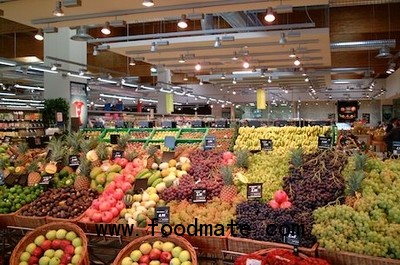"While European retailers are interested in developing direct procurement programmes, we at Coop still believe in direct imports from overseas, although we do control the production of some chains. Our sale and logistic system mean we still have to rely on importers, who have a fundamental role in re-packaging fruit according to our standards and delivering it to the various platforms."

As regards the introduction of innovations such as for example white strawberries, red lime and black tomatoes, the manager says that "In general, we appreciate research that not only guarantees good performances, but also produces innovation. Though I think that Italian consumers have a more pragmatic approach towards new and strange products. They are not explorers, but rather feel they know fruit and vegetables, which they tend to associate to a particular territory. Having said that, I believe that the sector will have far more varieties in the future, as it will have to come to terms with a more multi-ethnic society."
"Finally, we do not have direct contacts with seed companies for the planning of supplies like the big European chains have, although we would be interested in a cooperation to improve the taste of some varieties."
The fruit and vegetable department at COOP
"There have been no major changes in the way fruit and vegetables are displayed and in visual merchandising in the past few years. The fact that a greengrocer's is available in some of the stores has been well-received though. We are still working on things and all formulas must be experimented before implementing then, but sings are good, despite the crisis and the drop in consumption. The future of the sector may lay in the rediscovery of the relations with consumers."
"As regards displays, CPR is essential, as it meets our logistics needs. We have started to use other material though, and they are very important because they convey more of a market feel. Coop-branded products represent around 40% of the produce available."
"Concerning varieties, at the moment there are 13 varieties of apples displayed in supermarkets. In some stores, there are even some that many people are not familiar with, such as Campanine, Abbondanza and Mele Rosa. Then there are 11 tomato varieties i.e. green, smooth, ribbed, beef, small, cherry, bunch, Regina and those from Puglia and Campania. A great choice."
"If we exclude the seasonal categories, some of which are replaced by imported products, nowadays products are available the whole year round. Just think about apples, pears, oranges, kiwis, tomatoes and also other vegetables."
Competition of discount stores
"It is not easy to contrast the discount store channel on prices. In fact, we cannot discount our supply, as historically it is of high quality. We aim at the best possible supply with the best possible quality at the best possible price. We are working on improving the shopping experience by supplying traditional products. In a specific part of the Country we are selling 30 products in line with the lowest prices of the area. We will have to interpret the feedback, as probably consumers have other expectations than the lowest price at all cost."
Consumption
"Italian consumers choose Italian and local products. They are used to seeing products from other areas, even if they only buy them when nothing else is available. Many retailers however do sell imported produce at lower prices. There are exceptions, i.e. strawberries. At the beginning of spring, produce from Spain is ready and therefore people prefer it to the domestic one. The same goes for peaches and blond oranges."
"In Italy we are still a bit behind as regards the ready-to-eat sector, especially concerning exotic fruit. This is why from the 16th December until the 6th January we will organise an exotic event in thirty stores of Coop Estense with ready-to-eat mango, avocado and papaya."
"We are very careful about the fresh-cut range, as it is very important, even though, as there is not much room in the refrigerated aisles, we can only introduce products that are real innovations, which is not so straightforward most of the time."
The banana case
"There is not the same war on prices as in the Netherlands and UK, even though people often look at banana prices to assess whether a store is expensive or not. For this reason, Coop also supplies lowest price bananas and sets up many special offers."
"In addition to the lowest price, there are Coop-branded bananas, sold loose or packaged, organic ones, fairtrade under the Solidal-Bio Coop and even premium produce. In addition, the three Cooperatives in the North-West of the Country have also introduced loose Fairtrade produce under the Solidal Coop brand."
As regards ripening centres, which names like Edeka and Morrisons have, Cantieri says that "the ripening process needs too specific and specialised competences. It is not just setting up a warehouse with cold storage units, but also ethylene ripening units with different times and temperatures depending on the product. In addition, Coop controls the banana chain from production and decides which ripening centres to use, in fact producer - importer -ripener not always coincide."





